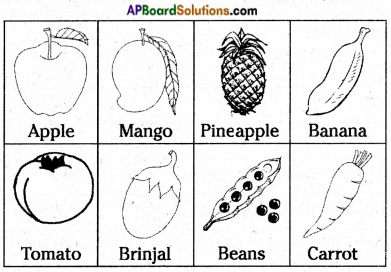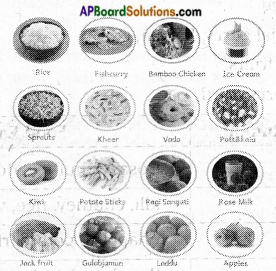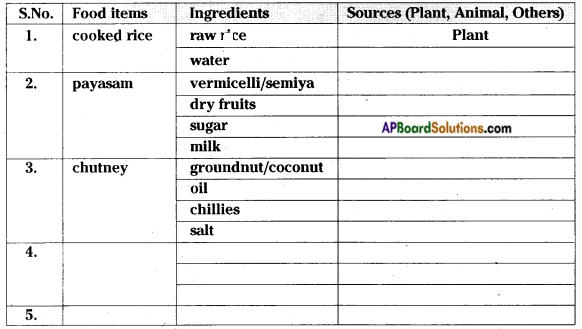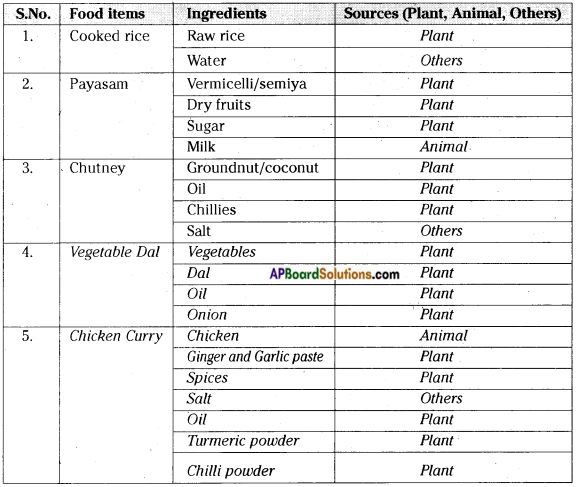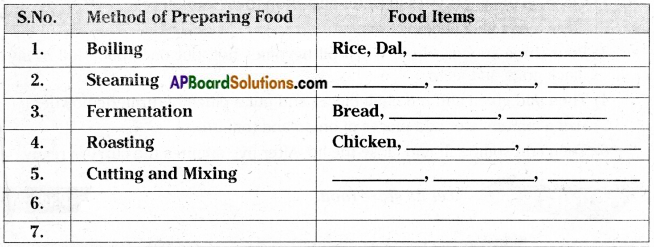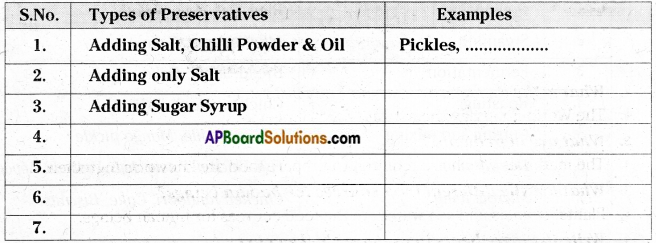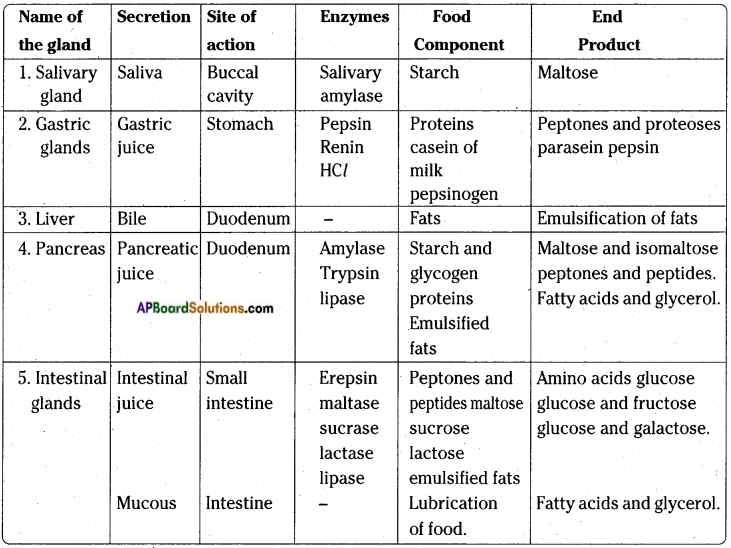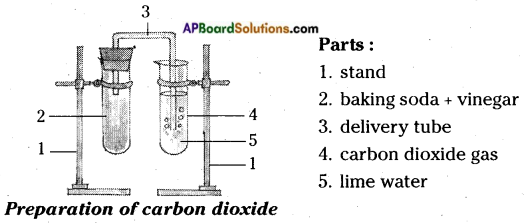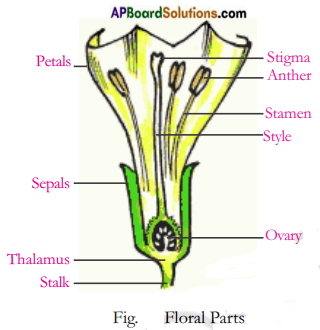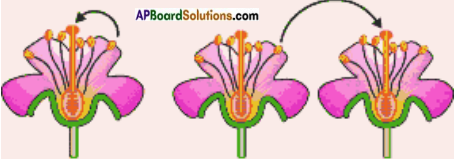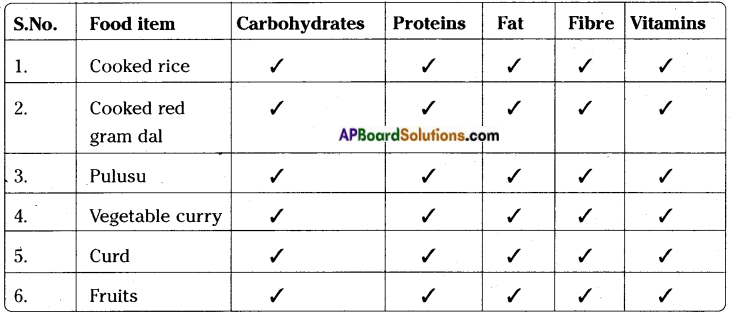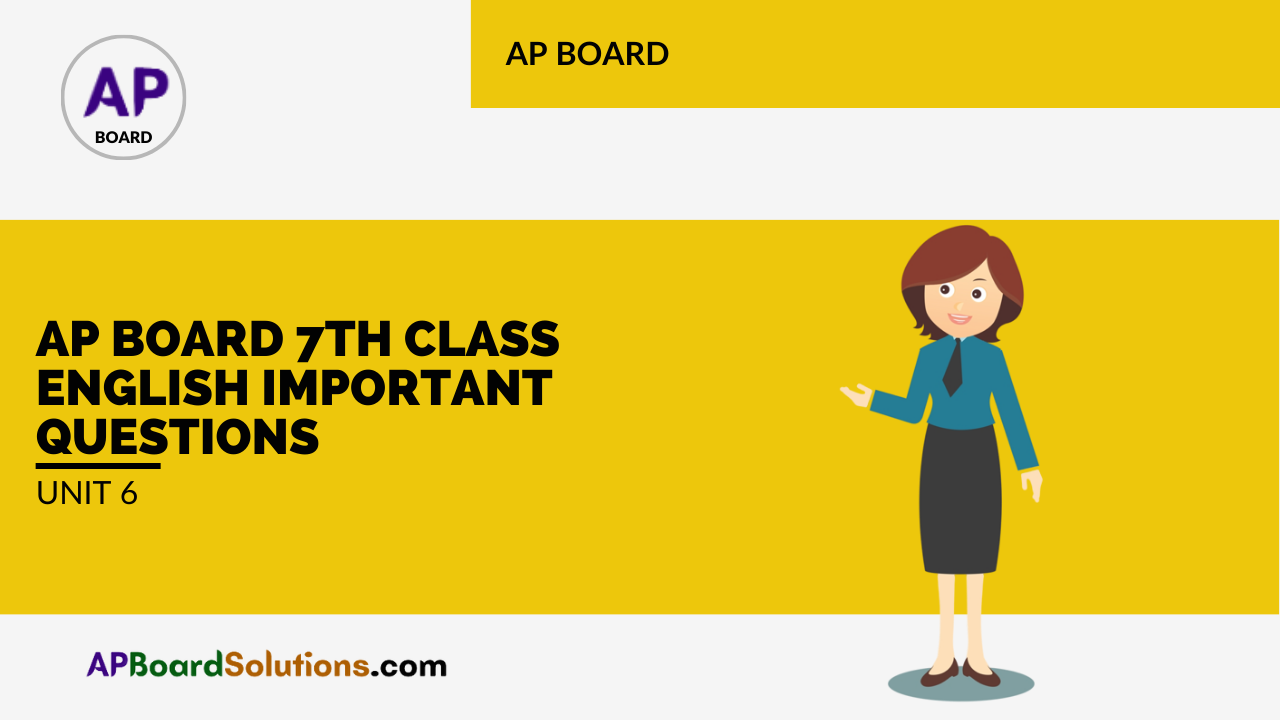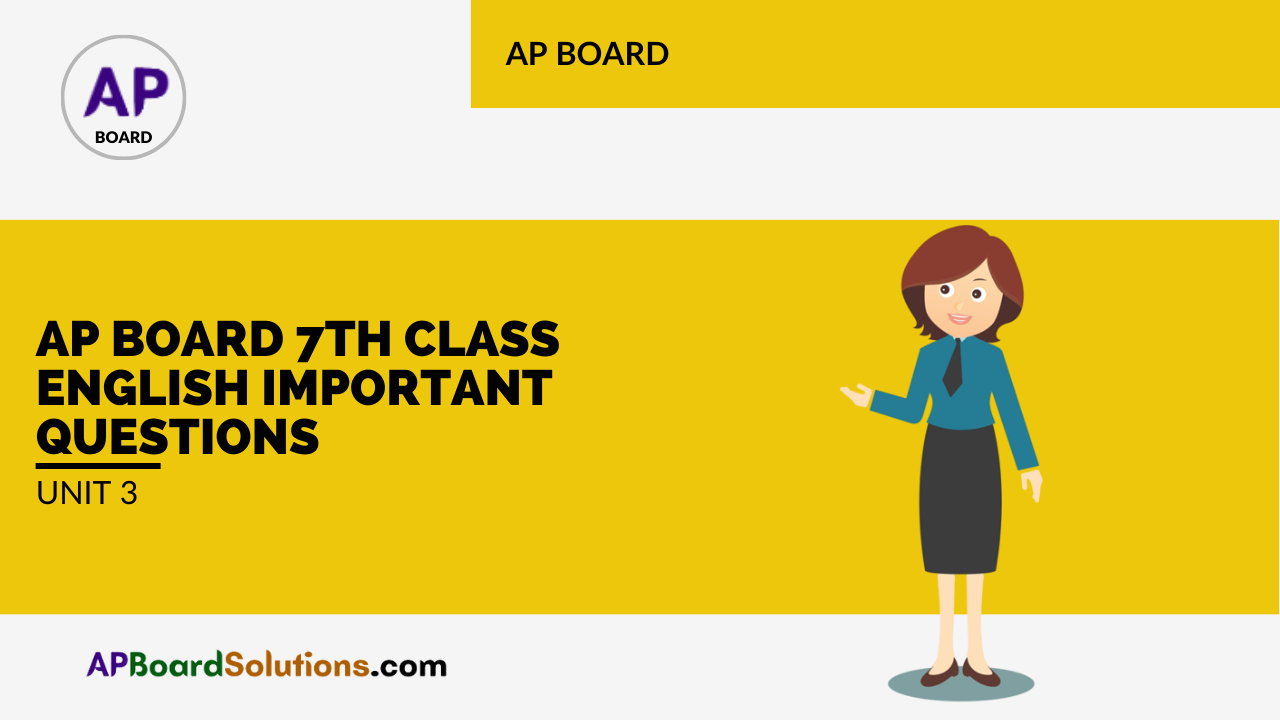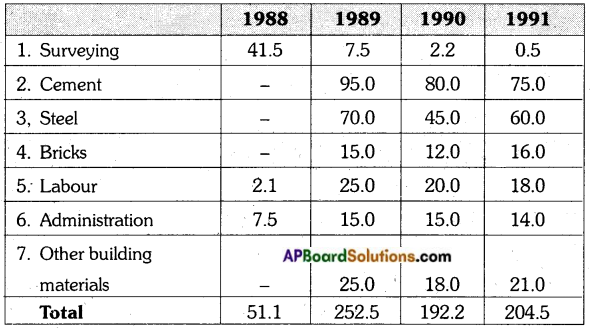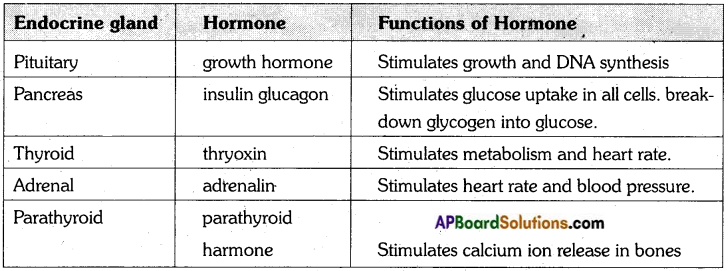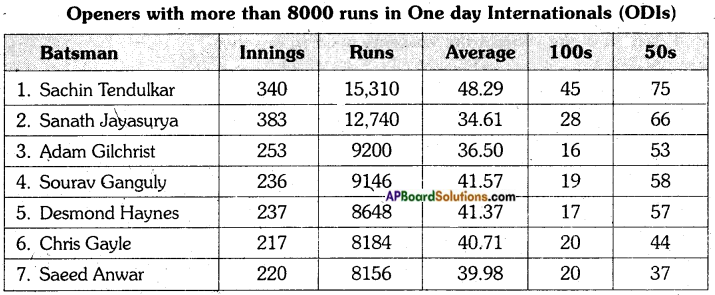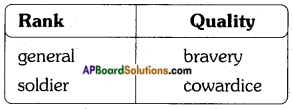AP State Syllabus 7th Class English Important Questions Unit 6
7th Class English Important Questions Unit 6
Section – A: Reading Comprehension
A. Reading
1. Read the following passage carefully.
Father was sitting under the hall lamp and reading the newspaper. He looked over the newspaper and said, “Swami, listen to this: News has been received about the bravery of a village lad who was returning home by the jungle path. While he was in the middle of the jungle, he came face to face with a tiger.” The newspaper gave a detailed account of the boy’s fight with the tiger. It also described how the boy flew up a tree where he stayed half a day. At last some people came that way and killed the tiger.
Now answer the following questions.
1) What was father doing?
2) What did father read in the newspaper?
3) Who was father speaking to?
4) What happened to the boy?
5) How did the boy escape from the tiger?
Answer:
1) Father was reading a newspaper.
2) Father read about a young boy who had fought bravely with a tiger.
3) Father was speaking to Sawmi, his son.
4) One day when he was travelling through a jungle he came face to face with a tiger. He bravely fought with a tiger.
5) The boy flew up a tree and he stayed half a day. At last some people came that way and killed the tiger. Thus the boy escaped from the tiger.

2. Read the following passage carefully.
“You think you know better than the newspaper?” Father said crossly. “A man may have the strength of an elephant and yet be a coward. “Another may be a mere skeleton; but if he has real courage, he can do anything. Courage is everything; strength and age don’t matter much.” “How can that be?” said Swami. “Suppose I had a lot of courage, but what could do if a tiger attacked me?”
Now answer the following questions.
1) Who does ‘you’ here refer to?
2) What does father say about courage?
3) Have strength and age anything to do with courage?
4) What is Swami’s belief about courage?
5) Do you think Swami is brave? How can you say?
Answer:
1) ‘You’ here refers to Swami.
2) Father says strength has nothing to do with courage weak people may be courageous and
strong people may not be courageous.
3) Strength and age have nothing to do with courage.
4) Swami believes that though people are courageous they can not face risks and dangers.
5) No. Swami is not courageous. He feels that he is courageous but he Says he can not face and fight with a tiger.
3. Read the following passage.
“Can you prove you have courage?” said Father with a scowl. “Let me see if you can sleep alone tonight in my office room.”
Swami had always slept beside his granny in the porch. The two always had their beds side by side. Any change in this arrangement kept him trembling and awake all night.
He hoped at first that Father was only joking. He tried to change the topic by saying, “Father, our captain says we shall have some elders also in our cricket club. He has asked me to tell you.” “We’ll see about that later,” Father cut in. “Hereafter you must sleep alone.” “From the first of next month, I’ll sleep alone,” Swami said very humbly, trying to please Father.“No, you must do it right from today,” Father said sternly. “Sleeping beside Granny or Mother like a baby is disgraceful. You are now in the Fifth Standard and I don’t like the way you are being brought up.”
Now answer the following questions.
1) What should Swami do to prove his courage?
2) Where does Swami always sleep?
3) “Any change in this arrangement kept him-trembling and awake all night.” – What does this tell us about Swami?
4) Why did father insist Swami to sleep alone?
5) What is disgraceful?
Answer:
1) Swami should sleep lonely in his father’s office room to prove his courage.
2) Swami always sleeps beside his grandmother in the Verandah.
3) This tells us that Swami is timid.
4) Swami’s wanted to make his to son courageous by making him sleep alone at night.
5) Sleeping beside his mother or grandmo’ther is disgraceful for a boy like Swami.

4. Read the following passage.
“Get up, Swami,” Father commanded. He looked like a ghost in the semi-darkness of the porch. Swami stirred and groaned as if in sleep.“Get up, Swami,” said Father a second time. “Why do you disturb him?” Granny pleaded.
“Get up, Swami,” said Father for the third time and Swami got up.
Father rolled up his bed, took it under his arm and said, “Come with me.”
Swami looked at Granny, hesitated for a moment, and then followed his father into the office room. “Let me sleep in the hall, Father,” Swami pleaded. “Your office room is very dusty and there may be scorpions behind your law books.”
“There are no scorpions, boy. You can sleep on the bench if you like.”
“Can I have a lamp burning in the room?”
“No. You must learn to be brave. You must not be afraid of darkness; it is only a question of habit.” It Will you at least leave the door open?” Swami said very humbly.
Now answer the following questions.
1) “Swami stirred and groaned as if in sleep” – What does this tell us? Was Swami really in sleep?
2) What do you understand about father after reading this passage?
3) “Swamy looked at Granny” – Why did Swami look at Granny?
4) What complaints did Swami make against sleep in his father’s room?
5) Why did father insist Swami to sleep in his office room?
Answer:
1) Swami was pretending that he was sleeping. Actually he was not sleeping.
2) Father is obstinate and commanding. He does not listen to any suggestions from anyone, if he decides to do anything.
3) Supposing that his grandmother would at least persuade his father not to make him sleep alone, Swami looked at his grandmother.
4) Swami complained that his father’s office room was dusty and there might be some scorpions behind his law books.
5) Father wishes that Swami should not be afraid of darkness. So he insisted Swami to sleep lonely in his office room.
5. Read the following passage.
Swami was pained and angry. He did not like the cruelty his father was showing. He cursed the newspaper that had printed the tiger’s story. He wished that the tiger had not spared the boy.
The night advanced and the silence in the house deepened. Swami’s heart began to beat faster. He remembered all the stones of devils and ghosts he had heard. He was almost faint with fear.
Now answer the following questions.
1) Why was Swami pained and angry?
2) What did he not like?
3) Why did he curse the newspaper?
4) Why did the boy wish that the tiger had not spared the boy?
5) What made Swami almost faint?
Answer:
1) Usually he used to sleep beside his grandmother in the verandah. But now he was forced to sleep alone in his father’s office room. This made Swami pained and angry.
2) Swami did not like the cruelty his father shown in making him sleep alone.
3) If the newspaper had not published the story of a brave boy, there would not have been a discussion about his courage and his father would not have asked him to sleep alone. So Swami cursed the newspaper for publishing the story of the brave boy.
4) If the tiger had not spared the boy and killed him, then the story would have been different, there would not have been a discussion, about courage and bravery between Swami and his father. So Swami wished that the tiger had not spared the boy.
5) 1) Swami was alone in the room.
2) The darkness and silence of the room made him frightened.
3) He remembered the stories of devils.
4) All these things made him almost faint with fear.
6. Read the following passage.
He heard a little rustling noise in the room.
“What can this be?” thought Swami and slowly opened his eyes.
Something was moving in the darkness. Swami lay gazing at it in horror. He was certain – that his end had come. The devil would soon pull him out and tear him to pieces!
“So what is the use of waiting?” Swami thought.
As it came nearer, Swami crawled out from under the bench. At once he clutched its leg and dug his teeth in.
There was a painful cry: “Aiyo! Something has bitten me.” Then there was heavy tumbling and falling amidst furniture. Everyone in the house was awakened by the loud noise. In a moment, Father and a servant came running with a light.
Now answer the following questions.
1) What was the rustling noise he heard?
2) Who does ‘he1 here refer to?
3) ‘What can this be?’ – What did Swami think it could be?
4) “So what is the use of waiting?” – What did Swami do? Why did he do so though he was timid?
5) “Aiyo! Something has bitten me.” – Who made this cry? What had bitten him?
Answer:
1) The burglar must have stepped on some papers, So it must have made a rustling stone.
2) ‘He’ here refers to Swami.
3) Swami thought that it could be a devil.
4) 1) Swami thought it was a devil. He thought it would drag him from under the bench and tear him into pieces the devil.
2) But he did not want to give a chance to harm him.
3) Whenever you are in a danger or risk, you should not let it to consume you. With your spontaneity and right-thinking at right time, you’ve to attack and try to overcome it. So Swami also did the right thing by biting the burglar hard.
5) The burglar made that cry. Swami had bitten him.

7. Read the following passage.
The next day was a day of congratulations for Swami. His classmates looked at him with respect. His teacher patted his back for his courage and bravery. The headmaster said that he was a true scout. Swami had bitten into the knee of a notorious house-breaker and the police were grateful to him.
Now answer the following questions.
1) Why was Swami congratulated?
2) How was he treated at school?
3) What was Swami patted for by the teachers?
4) How did the headmaster praise Swami?
5) Why were the police grateful to him?
Answer:
1) Swami was congratulated for catching a notorious criminal.
2) At school his classmates looked at him with respect and his teachers patted his back for his courage and bravery.
3) His teachers patted Swami for his courage and bravery.
4) The headmaster praised Swami as a true scout.
5) Swami caught a notorious house-breaker by biting his knee. So the police were grateful to him.
B. Reading
1. Read the following lines.
My plane was just about to crash.
So, I grabbed my bag and
Took out my big blue parachute
to glide me down and land.
At last, I found a spot to land.
But there was a big breeze.
And so, I had to painfully
land on these sharp pine trees.
I was then filled with bruises as a pine fell on my ear.
I sat down on the ground to rest.
Now answer the following questions.
1) What was going to happen?
2) How did the poet want to save himself?
3) What was the problem in landing?
4) What happened when the poet landed on the pine tree?
5) What did the poet do finally?
Answer:
1) The poet’s plane was going to crash.
2) with the help of a parachute
3) There was a big breeze and so the poet had to land painfully on the sharp pine trees.
4) When he landed on the pine trees he was wounded and there were bruises on hip body.
5) Finally he sat down on the ground to rest.
Additional Questions (i):
1) What happened to the plane?
2) How did the speaker use the parachute?
3) Where did the poet land?
4) Why Wouldn’t he land on the selected spot?
5) What is the colour of the parachute?
Answer:
1) The plane was about to crash.
2) for gliding down
3) He landed on the sharp pine trees.
4) because there was a big breeze
5) The parachute is in blue colour.
Additiional Questions (ii):
1) Who does T here refer to?
2) What did the speaker do when his plane was about to crash?
3) Why did he take out his parachute?
4) Why had he to land painfully?
5) What did he find at last?
6) What was the adventure He did?
7) Pick out the rhyming words.
Answer:
1) ‘I’ here refers to an imaginative boy.
2) He took his parachute out of his bag and jumped out of the crashing plane.
3) He took out his parachute thinking that it would help him glide down to ground.
4) There was a big breeze. Parachute was unable to land on a safe place so he had to land painfully.
5) At last he found a spot on the land.
6) He jumped out of the crashing plane and reached to the ground safely with the help of a parachute.
7) and – land; breeze – trees;

2. Read the following stanza.
I was then filled with bruises as
a pine fell on my ear.
I sat down on the ground to rest.
A thorn then poked me.
I slept on the ground frantically.
Mosquitoes bit my nose.
Bugs crept all over me
and tickled my body.
Now answer the follpwing questions.
1) Why was he filled with bruises?
2) Why did he sit down on the ground?
3) What poked him?
4) Which line in the stanza suggests that the speaker was dreaming?
5) What do you think that thorn could be?
6) How did he sleep?
7) What does the word ’frantically’ mean?
8) What crept all over his body?
9) What tickled his body?
10) Which word in the stanza gives the meaning of “an injury.”
Answer:
1) He landed on the sharp pine trees. So he was filled with bruises.
2) He sat on the ground to take rest.
3) A thorn poked him.
4) The line “I had to painfully land on these sharp pine trees.” Suggests us that he was dream¬ing.
5) Actually he was in a deep sleep. The thorn that poked him could be a sting of a mosquito.
6) He slept anxiously.
7) The word ‘frantically’ means ‘very anxiously’.
8) Some bugs crept all over his body.
9) The bugs which crept all over his body tickled his body.
10) bruises
3. Read the following stanza.
I scratched myself when I woke up,
appearing like a fool.
And after the whole thing I thought
I’d rather go to school.
Now answer the following questions.
1) Why did he scratch himself?
2) Why did the speaker feel like a fool?
3) What did the speaker finally want to do?
4) ‘And after the whole thing’ – What does’ the whole thing’ here mean?
5) List out the rhyming words in the stanza.
Answer:
1) He scratched himself to know whether it was real or he was in dream.
2) The speaker felt like a fool because he had dreamed a nasty adventure, which he actually could not attempt.
3) The speaker finally wanted to go to school.
4) The ‘whole thing,’ here means ‘the whole dream of his nasty adventure.’
5) ‘fool – school’ are the rhyming words in the stanza.
C. Reading
1. Read the following passage.
Kunwar Singh was the first to visit me the day I was given my first gun. I was eight then. He came early, and I put the old double-barrelled gun into his hands with great pride. He laid ‘the gun aside and said to me, “You are no longer a boy, but a man: and with this good gun you can go anywhere you like in the jungles and never be afraid provided you learn how to climb trees. I’ll now tell you a story to show how necessary it is for us, who shoot in the jungles, to know how to climb trees.
Now answer the following questions.
1) Who does ‘I’ here refer to?
2) Who was the first to’visit him when he was given the gun?
3) How old was the speaker when he was given the gun?
4) What should one learn to be courageous besides having a gun according to Kunwar Singh?
5) What is necessary for the hunters according to Kunwar Singh?
6) What do you think was the speaker?
Answer:
1) ‘I’ here refers to Jim Corbett.
2) Kunwar Singh was the first to visit him the day he was given the gun.
3) Jim Corbett was eight years old when he was given a gun.
4) Every hunter should leam to climb a tree besides having a gun to protect himself.
5) According to Kunwar Singh learning to climb trees is necessary for a hunter.
6) I think, the speaker was a hunter.

2. Read the following passage.
Har Singh and I went to shoot one day last April. We started when the stars were paling. Since we found nothing to shoot, we started for home towards evening. While we were taking a sandy nullah that ran through dense scrub and thorn-bamboo jungle, a tiger was looking at us. It stared at us for some time but went back.
Now answer the following questions.
1) Who does ‘I’ here refer to?
2) When did they start for shooting?
3) Why did they start towards home?
4) Where did they come across a tiger?
5) What did the tiger do?
Answer:
1) ‘I’ here refers to Kunwar Singh.
2) They started for shooting at the break of the dawn.
3) When they found nothing to shoot, they started towards home in the evening.
4) They came across a tiger in a dense scrub.
5) The tiger stared at them for some time and went back.
3. Read the following passage.
The tiger sprang at him and he was screaming. Now 1 fired the gun off into the air. The tiger went away and Har Singh collapsed at the foot of the tree. I climbed down very silently and went to Har Singh. I found that one of the tiger’s claws had entered his stomach and tom the lining from his navel to within a few fingers’ breadth of the back-bone. All his inside had fallen out. I could not know what to do. Har Singh told me to put his intestines back into his stomach. I stuffed them all back along with the dry leaves, grass and twigs that stuck to them.
Now answer the following questions.
1) “….. he was screaming” – Who does ‘he’ here refer to?
2) Who does ‘I’ here refer to?
3) What did the speaker do to frighten away the tiger?
4) Why was Har Singh collapsed?
5) “All his inside had fallen out.” – Why?
6) “All his inside had fallen out.” – What had fallen out?
7) What did Har Singh ask the speaker to do?
8) “I stuffed them all back” – What do ‘them’ here refer to?
9) How did Kunwar Singh stuff them in?
10) What did the speaker find when he climbed down the tree?
Answer:
1) ‘He’ here refers to Har Singh.
2) ‘I’ here refers to Kunwar Singh.
3) The speaker fired his gun off into the air to frighten away the tiger.
4) The tiger had torn his stomach off and his inner organs had fallen out. So he was collapsed.
5) The tiger had tom his stomach off and all his inner organs had fallen out of his stomach.
6) All his inner organs such as the intestines had fallen out of his stomach.
7) Har Singh asked the speaker to put his intestines back into his stomach.
8) ‘Them’ here refers to his intestines.
9) Kunwar Singh stuffed the intestines in along with dry leaves, grass and twigs that stuck to them.
10) When he climbed down the tree the speaker found that the tiger had tom Har Singh’s stomach.
4. Read the following passage.
Later I wound my pugree (turban) round his stomach and knitted it tight to keep everything from falling out again. We started for home walking for seven miles. I led the way and Har Singh followed me. Holding the pugree in position Har Singh told me that he wanted to . meet the doctor. We walked for the extra three miles to the hospital. It was night and the hospital was closed. But the doctor-babu who lived nearby was awake. He asked me to call Aladia, the tobacco-seller. When I returned, the doctor had laid Har Singh on a string bed. Aladia held the lantern and I held the two pieces of flesh together. The doctor was very kind. He sewed up the hole in Har Singh’s stomach. I offered him two rupees but he refused to take it. When we went home, the women folk were crying.
Now answer the following questions.
1) Who is the speaker of these lines?
2) Who does ‘he’ here refer to?
3) Who do ‘we’ here refer to?
4) What did he wind up with his pugree?
5) Why did they walk extra three miles?
6) What was Aladia?
7) Why was Aladia sent for?
8) How can you say that the doctor was very kind?;
9) “…… to keep everything from falling out again.” – What does everything here refer to?
10) Why were the womenfolk crying?
Answer:
1) The speaker of these lines is Kunwar Singh.
2) ‘He’ here refers to Har Singh.
3) ‘We’ here refer to Kunwar Singh and Har Singh.
4) He wound up Har Singh’s torn stomach with his pugree.
5) Har Singh said that he wanted to meet the doctor. So they had to walk for three miles.
6) Aladia was a tobacco-seller.
7) Supposing that he would hold the lantern when Har Singh was operated on.
8) 1) The doctor agreed to operate on Har Singh though it was late at night:
2) He did not accept money that was offered to him by Kunwar Singh.
3) Thus we can say that the doctor was a very kind man.
9) ‘Everything’ here means everything that had fallen out from Har Singh’s stomach.
10) Women feared that something terrible must have happened to Kunwar Singh and Har Singh. When the two had not reached home even at late night the womenfolk at home were crying.

Unseen Comprehension
1. Read the following passage carefully.
The Sun has set, and the pond is still.
John, Ned, Ben, Tom and Nell stand on the bank and look at the duck.
The dog with a black spot on his back is with Tom. See ! Tom has his hat in his hand. He has left his toy car on the box.
Kitty’s doll is on the rock. Nell has put her pet in the cage. It will sing a sweet song. The duck has her nest under the rock.
It is not hot now. Let us run and skip on the bank. Do you not think it is fun.
Now answer the following questions.
1) Do you think it is fun? How?
Answer:
Yes, it is funny. The sun is net. It is not hot now. Weather is plant. There are a lot of friends to play. They have some play things and pets’too. So it is funny.
2) How many friends are there in total? Who are they?
Answer:
There are 6 friends in total. They are John, Ned, Ben, Tom, Nell, and Kitty.
Choose the correct answer from the choices given.
3) What do John, Ned, Ben, Tom and Nell look at from the hank?
a) A frog
b) A cat
c) A duck
Answer:
c) A duck
4) Where is Kitty’s doll?
a) In her arms
b) On the rock
c) By her side
Answer:
b) On the rock
5) Where is the duck’s nest?
a) In a tree
b) Under the rock
c) On the grass
Answer:
b) Under the rock
2. Read the following passage carefully.
Penguins are birds that can not fly. Their wings are flippers which they use to help them travel upto thirty miles per hour in water. They also use their flippers for – balancing as they walk.
Penguins eat fish. They spend most of their time in the water. Penguins lay their and raise their young on land.
There are many kinds of penguins. Emperor penguins are the largest species of penguin and can grow to be about four feet tall, and weigh about one hundred pounds. Some other well known penguins are the King, the Macaroni and the Adelie.
Now answer the following questions.
1) What do penguins do with their wings?
Answer:
Penguin wings are flippers which are used to swim.
2) Name some kind of penguins.
Answer:
The king, the Macaroni and the Adelie are some kinds of Penguins.
Choose the correct answer:
3) A penguin is a/an ( )
a) bird
b) reptile
c) animal
Answer:
a) bird
4) Which of the following is the largest penguin ? ( )
a) Emperor
b) Marconi
c) King
Answer:
a) Emperor
5) Penguins eat ( )
a) insects.
b) fish.
c) birds.
Answer:
b) fish.

3. Read the following passage carefully.
Annie and Rosa were walking home. It was just getting dark. They got to the big, gray house. They always hated walking by that house. It was old and empty. It had many broken windows. Everyone said it was haunted.
As they went by, they heard a strange noise. It – sounded like a baby cry. They stopped and looked around but could not see anyone. The noise was coming from the house.
Rosa was very brave. She walked all the way up to the house. Suddenly Rosa began to laugh. She pointed to the roof and said, “Look, Annie, there’s our ghost.”
Annie looked. The noise was coming from a sacred little kitten. The kitten was stuck on the roof. “Sometimes things are not what they seem,” Annie said.
Now answer the following questions.
1) What is the story about?
Answer:
The story is about a strange noise in a big, gray house.
2) What caused the strange noise?
Answer:
A sacred little kitten struck on the roof causing the strange noise.
Choose the correct answer :
3) When did the story take place? ( )
a) early morning
b) noon time
c) late afternoon
Answer:
c) late afternoon
4) What kind of person is Rosa? ( )
a) sad
b) tired
c) brave
Answer:
c) brave
5) They always hated the house because ( )
a) it was old and empty.
b) a ghost was living in it.
c) everyone said it was haunted.
Answer:
a) it was old and empty
4. Read the following passage carefully.
My mother took my sister and me to see a play at the arts center. The play was about an Indian chef who liked to make pies. It was an exciting play to watch because a thief took a pie from the chef’s house. This made the chef sad. The chef was filled with grief over the pie being taken and he told his friends he was very sad.
Then the chef and thief decided to have a cooking contest to see who could make the best pie. The thief made a pie. The thief wanted to ‘tie’ for first place with the chef. But the chef made the best pie and won the prize.
The thief did not win, but he went home with his pie and told his wife a lie that he had won the pie-cooking contest. The thief’s wife did not see a prize. There was no prize money or ribbon for a prize. This was a clue that her husband did not ‘tie’ with the chief in the pie contest and that his story was just not true.
The wife asked her husband (the thief) for the money that was due as he had borrowed her money to buy to ingredients needed for the pie. ‘Yes!” she smiled, you need to pay me back the money that is due !”
And when he did that, the thief and his wife had a piece of pie!
Now answer the following questions.
1) What lie did the thief tell his wife and why did he lie?
Answer:
The thief said that he had won the pie contest. He wanted to win.
2) How did the wife know the thief was not telling the truth?
Answer:
He did not have a ribbon or money to show that he had won the contest.
Choose the correct answer:
3) In the text, what did the chief like to do? ( )
a) He liked to bake cakes.
b) He liked to make cakes.
c) He liked to ride horses.
Answer:
b) He liked to make cakes.
4) What did the thief steal? ( )
a) a bag of gold
b) money
c) a pie from the chef’s house
Answer:
c) a pie from the chef’s house
5) Who among the following to won the ‘cooking pie’ contest? ( )
a) the thief
b) the chef
c) wife of the thief
Answer:
b) the chef
5. Read the following passage carefully.
The Gseat Sphinx is a lion with the head of person cut out of rock. It is a statue located in Egypt. Legends have been told about the Great Sphinx. Many of these stories talk about the sphinx being strong and wise. The statue is very large. The whole statue is 150 feet long with 50 feet long paws. The head is 30 feet long and 14 feet wide. Wind and sand have worn parts of the statue’s nose and some other parts of the statue away completely. These parts will be restoring.
Now answer the following questions.
1) Why is the sphinx getting fixed?
Answer:
Wind and sand have worn out parts of the statue’s nose and some other parts of the statue away completely.
2) What is called restoring?
Answer:
The process of the fixation of the worn out parts of the statue of sphinx is called restoring.
Choose the correct answer from the choices given.
3) Sphinx is located in ( )
a) France
b) Egypt
c) America
Answer:
b) Egypt
4) How long are the paws of the sphinx? ( )
a) 150 feet
b) 50 feet
c) 30 feet
Answer:
b) 50 feet
5) Sphinx is a statue with ( )
a) the head of a lion and the body of a man.
b) the head of a tiger and the body of a lion.
c) the head of a man and the body of a lion.
Answer:
c) the head of a man and the body of a lion.

Unseen (Data Interpretation)
1. Read the following table. The table gives the sales details for textbooks and reference books at Primary / Secondary / Higher Secondary / Graduate levels.
| Year |
Primary |
Secondary |
Higher Secondary |
Graduate Level |
| 1975 |
42137 |
8820 |
65303 |
25343 |
| 1976 |
53568 |
10285 |
71602 |
27930 |
| 1977 |
58770 |
16437 |
73667′ |
28687 |
| 1978 |
56872 |
15475 |
71668 |
30057 |
| 1979 |
66213 |
17500 |
78607 |
33682 |
| 1980 |
68718 |
20177 |
82175 |
36697 |
Now answer the following questions
1) What does the table show?
Answer:
The table shows the sales details for textbooks and reference books at primary/seconday/ higher secondary/ graduate levels.
2) The sales of which category of books had recorded consistent growth?
Answer:
The sales of Graduate level of books have recorded the consistent during the period of 1975 – 1980.
Choose the correct answer from the choices given.
3) The sale of which level books is maximum in the total period, i.e. from 1975-1980? ( )
a) Primary level
b) Secondary
c) Higher secondary
Answer:
c) Higher secondary
4) Which level books were sold maximum in the year 1975? ( )
a) Primary
b) Secondary
c) Higher Secondary
Answer:
c) Higher Secondary
5) The books of which level are sold least during 1975 – 1980? ( )
a) Primary level
b) Secondary level
c) Graduate level
Answer:
b) Secondary level
2. Read the following table.
Number of Engineering students at Institutes of different kind.
| College |
1988 – 1989 |
1989-1990 |
1990 – 1991 |
| Private Engineering college |
12000 |
18000 |
25000 |
| Government Engineering colleges |
8000 |
12000 |
13000 |
| Regional Engeering college |
4000 |
7500 |
10000 |
| IIT |
3000 |
4000 |
8000 |
Now answer the following questions.
1) What does the table show?
Answer:
The table shows the number of engineering students studying at different institutes during the period 1989-89 to 1990-91.
2) What is the general trend of Engineering education?
Answer:
The general trend of engineering education has shown consistent growth during the given period.
Choose the correct answer from the choices given.
3) What was the total number of engineering students in 1989 – 90? ( )
a) 38500
b) 41500
c) 42500
Answer:
b) 41500
4) In which category of Engineering colleges highest number of students are studying Engineering? ( )
a) IITs
b) Govt. Engineering colleges
c) Private Engineering college
Answer:
c) Private Engineering college
5) In which category of colleges lowest number of students are studying Engineering? ( )
a) IITs
b) Govt. Engineering colleges
c) Regional Engineering colleges
Answer:
a) IITs

3. Read the following pie diagram.
Distribution of students at Graduate level in Seven Institutes named P, Q, R, S, T, M & N :
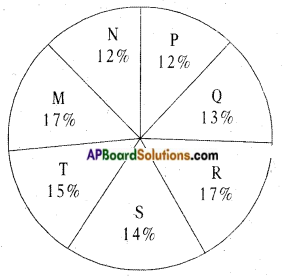
Now answer the following questions.
1) What does the above pie diagram show?
Answer:
The pie-chart shows the distribution of students at the Graduate level in seven institutes named P Q, R, S, T, M, N.
2) How many institutes are there in total?
Answer:
There are seven institutes in total.
Choose the correct answer from the choices given.
3) In which two institutes maximum number of students studied? ( )
a) N & P
b) R & M
c) Q & S
Answer:
b) R & M
4) In which two institutes least number of,students studied? ( )
a) Q & P
b) M & R
c) N & P
Answer:
c) N & P
5) The number of students of which college are exactly half of the sum of stu¬dents from Q & R ( )
a) P
b) Q
c) T
Answer:
c) T
Section – B: Creative Writing
1. Write about an act of bravery that you or your family member or any one of your friends may have shown at some stage in your life.
Answer:
An act of my bravery
My father runs a jewellery shop. The shop is open on all days. But it is closed on Sundays.
One Sunday evening, I was returning home after playing cricket with my friends. I was coming on my bicycle. On my way home, when I came to my father’s shop, I found my father’s shop was kept open. I was surprised to see it open as it was a Sunday. I got down my bicycle and put it behind a tree and stood there silently to see what was going to happen. A few minutes later, I saw two thieves coming from the shop with a bag of jewellery and keeping it in their car, kept outside the shop. They later, went again into the shop to bring some more.
At once, without any hesitation, I ran towards the car and took out the air from all the tyres. Then I rode on my bicycle to the nearby police station and informed the police about the theft.
The police took me in their jeep and came to the spot. Seeing the police, the thieves began to run. But the police chased them and caught hold of them. All our jewellery was kept back in the shop and then it was locked.
The police congratulated me on my act of bravery. All my friends and neighbours praised me for my bravery. I felt happy as I had saved our property.
2. Change the story of ‘A Hero’ into a drama.
Answer:
Scene-I
Swami’s house with father sitting in a chair and reading a newspaper and his son Swami standing behind him.
Characters: Swami, his father and his granny.
Father: Listen, Swami! I’ll read out an interesting news for you.
Swami: What’s it, Dad?
Father: It’s about the bravery of a village lad who was returning home by the jungle path.
Swami: What’s there in it about his bravery?
Father: He came face to face with a tiger and fought with it. Later he climbed on to the top branch of a tree and stayed there for half-a-day. Later some village people came that way and killed the tiger.
Swami: That couldn’t be. I think he must be a grown-up person.
Father: Don’t think so. Age and strength don’t matter with regard to courage/bravery.
Swami: Suppose I am very brave. Can I fight with a tiger?
Father: O.K. I will test your courage. Tonight, sleep alone in the dark in my office room and prove your bravery.
Swami: L will do it next month. Please put it off.
Father: No, come on with me.
(Father puts Swami alone in his office room. He leaves him in the dark but keeps the doors open)
Scene – II
Place: Father’s office room. Swami is sleeping under a bench.
Characters: Swami, a burglar, Father.
Swami to himself: I don’t know why father is cruel to me in this manner. I wish the tiger had not spared the village lad.
A burglar to himself: The door is open. I will enter the room and steal the valuable things. (The burglar walks in and steals something. He comes near the boy.
(Swami hears the sound of his walking close to him.)
Swami to himself: What is this sound? I think a devil is coming to kill me now. I will dig my teeth into its leg.
(When the burglar comes nearer, Swami digs his teeth into the knee of the burglar.) ‘
The burglar: Oh! I was bitten.
(Hearing the sound, Father and a servant come into the room and catch the thief.)
Scene – III
Place: School
Characters: Swami, his friends, a teacher and the Headmaster.
Teacher: Oh! You have acted bravely. I appreciate you.
Swami: Thank you, teacher.
Friends: Swami, you have done a marvellous thing. Congrats.
Swami: It’s O.K.
H.M.: Swami, you are a true scout. You have proved your bravery. We are proud of you.
Swami: Thank you, Sir.
(But the next day on wards, Swami sleeps in his usual place.)
3. Have a discussion in the whole class on how the performance could be im¬proved in terms of delivery of dialogues, costumes, action, settings, etc.
A Skit on ‘A Hero
The performance could be improved and made humorous if it was as follows.
When father exits the office-room
Swami (to himself): I am afraid I can’t be alone. What should I do? Idea! I shall go unnoticed into my father’s bed room, pick up his cell-phone and call my close friend, Guruvardhan.
(The boy tiptoes into his father’s bed room, picks up his mobile, comes out and makes a phone call to his friend, Guruvardhan.)
Swami: Hello Guru! I’m Swami.
Guruvardhan: Hello Swami! Whats the matter? Why are you calling me at this time? Any problem?
Swami: Yes. Guru. Can you come to my house now and spare an hour with me?
Guruvardhan: Why?
Swami: I’ll tell you here. Please do come soon.
(Swami deletes the number of his friend from his father’s mobile from dialed numbers, keeps it there and comes back into his fathers office room. Half an hour later, his friend enters the room)
Swami: Hai! Come in. I feel bored being alone.
Guruvardhan: Why alone here?
Swami: My father does this as a test for my bravery. Give me some idea.
(Guruvardhan thinks over it for a while)
Guruvardhan: I’ll take some valuable things from this office room and throw them scattered at the gate of your house and go back home. Half an hour later, you cry out Thief, thief, I cant chase .him. Please help’ and walk hurriedly to the gate. Your father comes. Tell him you are trying to catch the thief who entered and stole the things. Also tell him he has left them there and escaped. Your father then appreciates your bravery. How is it?
Swami: It’s a good idea. Let’s do it at once.
(They implement their plan. His friend has gone home, leaving the things at the gate)
Swami: Thief, thief! catch him. (Shouts loudly)
(His father and a servant come there with a torchlight in hañds.)
Father: Where is the thief? What has happened?
Swami: Dad! A thief has entered the office room and stole some valuable things. I heard the sound and cried. He began to run. I tried to catch him. But he escaped. leaving these things here.
Father: (looking at them) Oh! these are very valuable. Had I lost them, I would have been in great trouble. Really you have done a very good job.
I appreciate your bravery.
(All the members of his family praise him.)

4. In the lesson ‘A Hero’ you have read a conversation based on the news from a newspaper. Swami’s family discussed the bravery of a village boy who fought with a tiger. Imagine that you were Swamy and describe your feelings when you came face to face with a tiger.
You may use the following hints to describe your feelings :
Big tiger – staring at me – very ferocious – what to do – run away – hide in the bushes – search for stones – no weapons – nobody nearby – can’t shout for help – gets idea – fight with all energy – kick the tiger on its face – run and climb the tall tree – call the villagers – rescue – kill the tiger.
Answer:
Once I was walking through a thicket. It was a sunny afternoon. I was walking alone. No one was there. At once I saw a big tiger behind a bush. It was staring at me. It was ferocious. I was frightened. I did not know what to do. I was unable to decide whether to run away from there or hide in the bushes. Since I had no weapons I searched for stones. There was nobody nearby. I could riot shout for help. Then I got an idea. I decided to fight with all energy. I kicked the tiger on its face. I ran and climbed a tall tree. I called the villagers. They came running and rescued me by killing the tiger.
5. Summarize the story using the following hints.
Swami – the news report – about a boy’s fight – father’s advice – sleeps in his grandmother’s room – father insists on sleeping alone – a terrible dream – catches a thief – becomes a hero.
Answer:
One day Swami’s father read out some news in some newspaper for his son, Swami. The news was about the bravery of a village lad who was returning home by the jungle path. The newspaper gave a detailed account of the boy’s fight with the tiger.
After listening to the news, Swami said that a boy could not be brave enough to fight with a tiger. Then Swami’s father asked him to prove his courage. For that, his father advised him to sleep for some nights alone in his office room. He wanted his son to do it that night itself. But Swami went into the porch and slept beside his granny. Swami never slept alone. He always slept beside his granny.
Then his father came to Swami and woke him up. He insisted Swami on his sleeping alone in the office room that night. Swami tried to escape but in vain. So he had to sleep alone in darkness in his father’s room that night. Then Swami had a terrible dream. He could not sleep. Suddenly he heard that someone was coming towards him. He thought he was a ghost. So, at once, to protect himself, Swami bit into the knee of a thief. The thief cried out. Father and a servant came and caught the thief. Swami became a hero.
Vocabulary
1. Read the following paragraph and write the synonyms of the underlined words choosing the words from the words given in the box.
1.

“Swami, listen to this: News has been received about the bravery (a) of a village lad (b) who was returning home by the jungle (c) path (d). While he was in the middle of the jungle, he came face to face with a tiger.”
2.

“Can you prove you have courage (a)” said Father with a scowl (b). “Let me see if you can sleep, alone tonight in my office room.”
Swami had always slept beside his granny in the porch (c). The two always had their beds side by side. Any change in this arrangement kept him trembling (d) and awake all night.
3.

“From the first of next month, I’ll sleep alone,” Swami said very humbly (a), trying to please (b) Father.“No, you must do it right from today,” Father said sternly (c). “Sleeping beside Granny or Mother like a baby is disgraceful (d). You are now in the Fifth Standard and I don’t like the way you are being brought up. ”
4.

“Get up, Swami,” Father commanded (a). He looked (b) like a ghost in the semi-darkness of the porch. Swami stirred (c) and groaned as if in sleep.“Get up, Swami,” said Father a second time. “Why do you disturb him?” Granny pleaded (d).
5.

Swami was pained and angry. He did not like the cruelty (a) his father was showing. He cursed (b) the newspaper that had printed the tiger’s story. He wished (c) that the tiger had not spared (d) the boy.
6.

The night advanced (a) and the silence in the house deepened (b). Swami’s heart began to beat faster. He remembered all the stories of devils and ghosts he had heard. He was almost faint (c) with fear. Swarmi hurriedly (d) got up.
7.

Swami hurriedly got up (a) and spread his bed under the bench and crouched (b) there. It seemed to be a much safer place. He shut his eyes tight and encased (c) himself in his blanket. Unknown to himself, Swami fell asleep. In his sleep he had a terrible dream. He groaned in despair, (d).
8.

Something was moving in the darkness. Swami lay gazing (a) at it in horror (b). He was certain (c) that his end had come. The devil would soon pull him out and tear him to pieces!
“So what is the use of waiting?” Swami thought.
As it came nearer, Swami crawled out from under the bench. At once he clutched, (d) its leg and dug his teeth in.
9.

Both of them fell on the burglar (a) who lay amidst the furniture with a bleeding knee.
The next day was a day of congratulations for Swami. His classmates looked at him with respect. His teacher patted his back for his courage and bravery. The headmaster said that he was a true scout (b). Swami had bitten into the knee of notorious (c) house – breaker and ‘ the police were grateful (d) to him.
Answer:
1. a) courage b) a young boy c) forest d) way
2. a) bravery b) anger c) verandah d) shaking
3. a) meekly b) satisfy c) determinedly d) shameful
4. a) ordered b) appeared c) moved d) appealéd
5. a) harshness b) damned c) hoped d) allowed to go free
6. a) progressed b) extended c) become unconscious d) speedily
7. a) raised b) stooped low c) covered d) anguish
8. a) staring b) fear c) sure d) caught
9. a) thief b) adventurer c) bad d) thankful

2. Read the following paragraph and write the antonyms of the underlined words.
1. “You think you know better than the newspaper?” Father said crossly. “A man may have the strength (a) of an elephant and yet be a coward (b). “Another may be a mere skeleton; but if he has real (c) courage (d), he can do anything.
2. He hoped (a) at first that Father was only joking. He tried to change the topic by saying, “Father, our captain says we shall have some elders (b) also in our cricket club. He has asked me to tell you.’’“We’ll see about that later (c),” Father cut in (d). “Hereafter you must sleep alone.”
3. “From the first of next month, I’ll sleep alone,” Swami said very humbly (a), trying to please (b) Father.“No, you must do it right from today,” Father said sternly (c). “Sleeping beside Granny or Mother like a baby is disgraceful (d). You are now in the Fifth Standard and I don’t like the way you are being brought up.”
4. “Get up (a), Swami,” said Father for the third time and Swami got up. Father rolled up his bed, took it under his arm and said, “Come with me.”
Swami looked at Granny, hesitated (b) for a moment, and then followed (c) his father into the office room. “Let me sleep in the hall, Father,” Swami pleaded. “Your office room is very dusty (d) and there may be scorpions behind your law books.”
5. Swami was pained and angry (a). He did not like (b) the cruelty (c) his father was showing. He cursed (d) the newspaper that had printed the tiger’s story.
6. The night advanced (a) and the silence (b) in the house deepened. Swami’s heart began to beat faster, (c) He remembered (d) all the stories of devils and ghosts he had heard. He was almost faint with fear.
7. A tiger was chasing him. Swami tried hard (a) to escape (b) but his feet would not move. He tried to open his eyes but his eyelids would not open (c). He groaned in despair (d).
8. At last (a), using utmost effort he opened (b) his eyes. He put his hand out to feel his granny’s presence (c), as was his habit. But he only touched the wooden leg of the bench! At once his lonely state came back to him. He shook in fear and closed his eyes. He heard a little rustling noise (d) in the room.
9. The next day was a day of congratulations (a) for Swami. His classmates looked at him with respect (b). His teacher patted his back for his courage and bravery. The headmaster said that he was a true (c) scout. Swami had bitten into the knee of a notorious (d) house-breaker and the police were grateful to him.
Answer:
1. a) weakness b) hero; brave c) unreal d) cowardice/timidity
2. a) despaired b) youth c) earlier d) continued
3. a) proudly b) displease c) lightly d) respectable
4. a) Lie down b) continued c) led d) clean
5. a) calm b) dislike c) kindness d) blessed
6. a) declined b) noise c) slower d) forgot
7. a) easy b) remain c) shut d)hope
8. a) Initially b) closed c) absence d) silence
9. a) criticism b) humiliation c) false d) famous
3. Fill in the blanks with the right form of the words given in brackets.
1. After _________ (a) (read/reading) it through, Father looked at Swami _________ (b) (fixedly/fixed) and asked, “V.hat do you say to that?” I think he must have been a very strong and _______ (c) (grow/grown)-up person, not a boy at all,” said Swami. ‘Show
could a boy fight a tiger?”
“You think you know better than the newspaper?” Father said , _______ (d) (cross/crossly).
2. Swami said very humbly, _______ (a) (try/trying) to – (b) (please/pleasing) Father.”No, you must do it right from today,” Father said sternly. “ __________ (c) (Sleep/Sleeping) beside Granny or Mother like a baby is __________ (d) (disgraceful/disgrace).
3. Father lifted the newspaper to his face and started __________ (a) (reading/read) it again. Swami rose __________ (b) (quiet/quietly) from his place and __________ (c) (tiptoed/tiptoe) to his bed in the porch. Granny was sitting up in her bed, and she said, “Boy are you already feeling ________ (d) (sleepy/sleep) today? Don’t you want to hear a story?”
4. Swami looked at Granny, _________ (a) (hesitate/hesitated) for a moment, and then followed his father into the office room. “Let me __________ (b) (sleep/sleeping) in the hail, Fàther,” Swami pleaded. “Your office room is very _________ (c) (dust/dusty) and there may be scorpions behind your law books.”
“There are no scorpions, boy. You cn sleep on the bench if you like.”
“Can I have a lamp (d) (burning/bum) in the room?”
5. “No. You must learn to be _________ (a) (bravely/brave). You must not be afraid of__________ (b) (dark/darkness); it is only a question of habit.” “Will you at least leave the door (c) (opening/open)?” Swami said vely_______ (d) (humble/humbly).
6. Swami was pained and _________ (a) (angrily/angry). He did not like the_________ (b) (cruelty/cruel) his father was showing. He cursed the newspaper that had printed the tiger’s story. He wished that the tiger had not spared the boy. The night advanced and the (c) (silent/silence) in the house__________ (d) (deepen/deepened).
7. At last, using utmost effort he opened his eyes. He put his hand out to _________ (a) (feeling/feel) his grannys __________ (b) (present/presence), as was his habit. But he only touched the wooden leg of the bench! At once his __________ (c) (lone/lonely) state came back to him. He shook in fear and closed his eyes. l-le heard a little _______ (d) (rustle/rustling) noise in the room.
8. Something was moving in the darkness. Swami lay _________ (a) (gaze/gazing) at it in horror. He was __________ (b) (certain/certainly) that his end had come. The devil would soon pull him out and _____ (c) (tom/tear) him to pieces! “So what is the use of _____ (d) (waiting/wait)?” Swami thought.
9. There was a _________ (a) (pain/painful) cry: “Aiyo! Something has bittet me.” Then there was heavy _________ (b) (tumbling/tumble) and falling amidst furniture. Everyone in the house was __________ c) (awaken/awakened) by the loud noise. In a moment, Father and a servant came _____ (d) (run/running) with a light.
10. Both of them fell on the burglar who lay amidst the furniture with a (a) (bleeding/bleed) knee.
The next day was a day of _________ (b) (congrtulate/congratulations) for Swami.
His classmates looked at him with respect. His teacher patted his back for his courage and _________ (c) (bravery/brave). The headmaster said that he was a _______ (d) (truth/true) scout.
Answer:
1. a) reading b) fixedly c) grown d) crossly
2. a) trying b) please c) sleeping d) disgraceful
3. a) reading b) quietly c) tiptoed d) slèepy
4. a) hesitated b) sleep c) dusty d) burning
5. a) brave b) darkness c) open d) humbly
6. a) angry b) cruelty c) silence d) deepened
7. a) feel b) presence c) lonely d) rustling
8. a) gazing b) certain c) fear d) waiting
9. a) painful b) tumbling c) awakened d) running
10. a) bleeding b) congratulations c) bravery d) true
а) Complete the following words using ai, au, ea, ee, ei, ie, io, oa, oe, oi, oo, ou, ue, ui.
1) The newspaper gave a (a) det _ _ led (b) acc _ _ nt of the boy’s fight wfth the tiger.
2) If he has (a) r _ _ l (b) c _ _ rage, he can do anything.
3) I don’t like the way you are (a) b _ _ ng (b) br _ _ ght up.
4) Swami rose (a) q _ _ etly from his place and (b) tipt _ _ d to his bed in the porch.
5) You must not be (a) afr _ _ d of darkness; it is only a (b) q _ _ stion of habit.
6) If you do it, I’ll tell your (a) t _ _ cher and make you the (b) l _ _ ghing stock of the whole school.
7) The night advanced and the silence in the (a) h _ _ se (b) d _ _ pened.
8) Swami’s (a) h _ _ rt began to(b) b _ _ t faster.
9) Swami (a) sp _ _ d his bed under the bench and (b) cr _ _ ched there.
10) He (a) gr _ _ ned in (b) desp _ _ r.
11) He (a) sh _ _ k in (b) f _ _ r and closed his eyes.
12) He heard a little rustling (a) n _ _ se in the (b) r _ _ m.
13) The devil would (a) s _ _ n pull him out and tear him to (b) p _ _ ces!
14) Swami bit into the (a) kn _ _ of a (b) notor _ _ us house breaker.
15) The headmaster said that he was a (a) tr _ _ (b) sc _ _ t.
16) He felt a (a) gr _ _ t (b) re _ _ f.
Answer:
1. a) detailed b) account
2. a) real b) courage
3. a) being b) brought
4. a) quietly b) tiptoed
5. a) afraid b) question
6. a) teacher b) laughing
7. a) house b) deepened
8. a) heart b) beat
9. a) spread b) crouched
10. a) groaned b) despair
11. a) shook b) fear
12. a) noise b) room
13. a) soon b) pieces
14. a) knee b) notorious
15. a) true b) scout
16. a) great b) relief
b) Complete the words with the correct suffixes given in brackets.
1) News has been received about the (a) bray _____ (ary/ery) of a village lad who was (b) return _____ (ing/ning) home by the jungle path.
2) Any change in this (a) arrange _____ (mant/ment) kept him (b) tremb _____ (leing/ling) and awake all night.
3) ‘No,” Father said (a) stern _____ (ly/lly). “Sleeping beside Granny or Mother like a baby is (b) disgrace _____ (ful/ful).
4) ‘You must not be afraid of (a) dailc _________ (nes/ness) .“ ‘Will you at least leave the door open ?“ Swami said very (b) hum _____ (blely/bly).
5) The night advanced and the (a) siten _____ (se/ce) in the house (b) deep _____ (end/ened).
6) Swami had bitten into the knee of a (a) notori _____ (aus/ous) house-breaker and the police were (b) grate _____ (ful/full) to him.
7) Swami was (a) follo _____ (wing/ing) the whole (b) conversa _____ (ssion/tion) from under the blanket.
8) a) There was a pain _____ (full/ful) cry.
b) “Let him sleep where he likes,” Mother said angr _____ (yly/ily).
Answer:
1. a) bravi b) returning
2. a) arrangement b) trembling
3. a) sternly b) disgraceful
4. a) darkness b) humbly
5. a) silence b) deepened
6. a)notorious b) grateful
7. a) following b) conversation
8. a) painful b) angrily

c) Find the wrongly spelt word and write the correct spelling.
1. a) biting; fighting; hating; siting
b) believe; relieve; achieve; recieve
2. a) detail; account; describe; captan
b) coward; courage; strength; skeleten
3. a) courage; passage; luggage; marrage
b) tinful; mouthful; houseful; disgracefull
4. a) comand; demand; remand; reprimand
b) croch; approach; coach ; touch
5. a) dependent; confident; present; servent
b) rubber; scrubber; burgler; joker
Answer:
1) a) sitting b) receive
2) a) captain b) skeleton
3) a) marriage b) disgraceful
4) a) command b) crouch
5) a) servant b) burglar
Put the following under the correct headings.
A.

Answer:
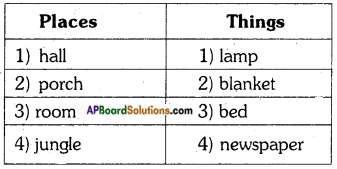
B.

Answer:
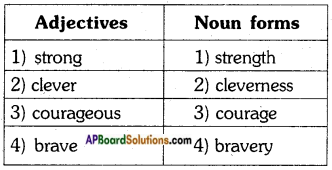
C.

Answer:
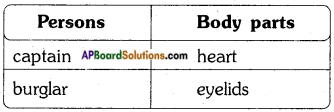
D.

Answer:

Match the parts under A and B to make some proverbs. You can use the clues given within the brackets.
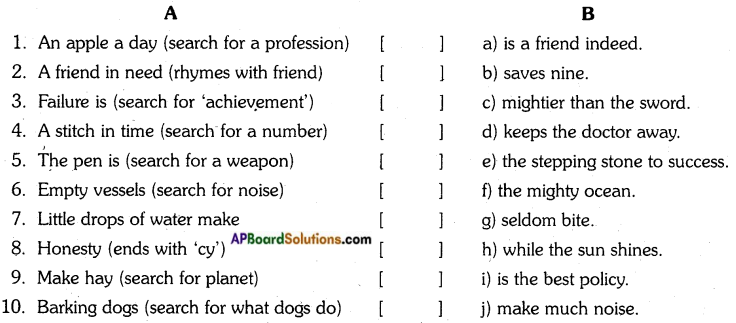
Answer:
1) d
2) a
3) e
4) b
5) c
6) j
7) f
8) i
9) h
10) g
A) Write meaningful sentences using the words given below.
i) while:
ii) beside:
iii) later:
iv) even if:
v) almost:
vi) hurriedly:
vii) seem:
viii) utmost:
ix) at once:
x) certain:
Answer:
i) While he was crossing the bridge, his hat blew off.
ii) Come and sit beside me.
iii) We’ll meet later and discuss about it.
iv) I like her, even if she can be annoying at times.
v) The story is almost certainly false.
vi) I hurriedly got up and dressed.
vii) You seem happy.
viii) You should study this document with utmost care,
ix) At once she lost her temper.
x) If is certain he will succeed.

B) Pick out the synonyms from the story for each of the following words.
1) clear
2) bravery
3) shameful
4) hide
5) upset
6) argued
7) swore
8) unpleasant
9) tapped
10) damage
Answer:
1) clear: detailed
2) bravery: courage
3) shameful: disgraceful
4) hide: cover
5) upset: pained
6) argued: mumbled/exclaimed/opined
7) swore: cursed
8) unpleasant: bitter
9) tapped: patted
10) damage: risk
C) Read the conversation given below and fill in the blanks with appropriate words from the box.

Ruchira : I don’t know why the teacher ….(1)…. to give his mobile number?
Suhas : He might be worried that you would ….(2)…. him with your phone calls.
Ruchira : I have great ….(3)…. for him. I will never behave in a ….(4)…. manner.
Su has : I am ….(5)…. that our teacher will not give his number. Anyhow, I like your ….(6)…. We are all ….(7)…. him.
Ruchira : I don’t think our teacher is ….(8)…. but he says everything ….(9)…. Once he gave me a wonderful gift so I am always ….(10)…. to him.
Answer:
1) hesitated
2) disturb
3) respect
4) disgraceful
5) certain
6) courage
7) afraid of
8) terrible
9) sternly
10) grateful
D) Match the following idioms by writing the letter from column B in the blanks.

Answer:
1-D
2-F
3-B
4-A
5-C
Grammar
1. Edit the following passage correcting the underlined parts.
1. Plants have many uses to (a) map. They supplies (b) us with food and shelter, with fuel and chemicals. People or (c) animals need to breathe oxygen to live. Plants take in the carbon dioxide what (d) people and animals breathe out.
2. Eskimos live in houses called Igloos. A (a) igloo is made with (b) large square pieces of Ice. And (c) the igloo itself is not square. It look (d) like half of a big white ball standing on a white filed of Ice.
3. A (a) famous Indian mathematician, Srinivasa Ramanujan, was born in 1987 in a poor family in (b) Erode in Tamil Nadu. At a very young age, Ramanujan showed a (c) unusual grasp of mathematics. It was (d) strange but true that he did not see his first mathematics book till he was sixteen.
4. Mount Everest is a (a) highest peak in the world. It was (b) 8848 metres high. It is named on (c) Everest. Edmand Hillary and Sherpa Tenzing sets (d) foot on the top of the peak on 29th May 1953.
5. Everyone are (a) afraid of earthquakes. They are quite common in eastern countries like China, Indonesia, Malaysia and Japan. They are the most deadly in (b) all natural calamities. Two of the greatest earthquakes occur (c) in China or (d) Alaska.
Answer:
1. a) for b) supply c) and d) that
2. a) An b) of c) But d) looks
3. a) The b) at c) an d) is
4. a) the b) is c) after d) set
5. a) is b) of c) occurred a) and
2. Complete the passage choosing the right words from those given below.
Each blank is numbered and for each blank four choices (A), (B), (C) and (D) in the blanks.
1. life in a big oasis _________ (1) extremely busy. There is _______ (2) busy market in the oasis _________ (3) the people from the neighbouring desert bring (4) animals to exchange for the goods of the oasis.
1) A) is B) was C) are D) were
2) A) the B) a C) an D) some
3) A) but B) and C) or D) yet
4) A) her B) his C) our D) their

2. (1) Earth rotates around itself and also revolves round the Sun. To ________ (2) Itself. It _________ (3) Oneday and to revolve round the Sun. It takes 365.25 days. The earth revolves round the Sun _________ (4) an elliptic orbit.
1) A) an B) a C) the D) that
2) A) rotating B) rotate C) rotates D) rotated
3) A) take B) took C) takes D) taking
4) A) on B) of C) in D) by
3. The Banyan trees _________ (1) aerial roots ________ (2) is its branches ________ (3) to the ground, take root again and send more branches _________ (4) their own.
1) A) has B) had C) have D) h ing
2) A) which B) that C) who D) whom
3) A) drops B) dropped C) drop D) dropping
4) A) of B) on C) in D) at
4. Lizards are closely related _________ (1) snakes. Like snakes, _________ (2) are cold blooded reptiles _________ (3) scaly skins. Unlike snakes their long bodies are usually divided into the three distinct parts : head. trunk _________ (4) tail.
1) A) with B) for C) to D) from
2) A) we B) they C) she D) he
3) A) of B) with C) for D) in
4) A) and B) or C) but D) yet
5. The Dinosaurs ________ (1) cold-blood creatures. They could not heat ________ (2) own bodies. They needed the heat _________ (3) the Sun to stay alive and _________ (4) about.
1) A) are B) were C) is D) was
2) A) his B) its C) their D) our
3) A) of B) from C) for D) with
4.) A) moves B) moved C) moving D) move
Answer:
1. 1-A; 2-B; 3-A; 4-D
2. 1-C; 2-B; 3-C; 4-C
3. 1-C; 2-B; 3-C; 4-B
4. 1-C; 2-B; 3-B; 4-A
5. 1-A; 2-C; 3-B; 4-D
3. Change the words given in the box into different parts of speech. Some words may not have all the forms given in the table. You may use a dictionary if you like.
A)

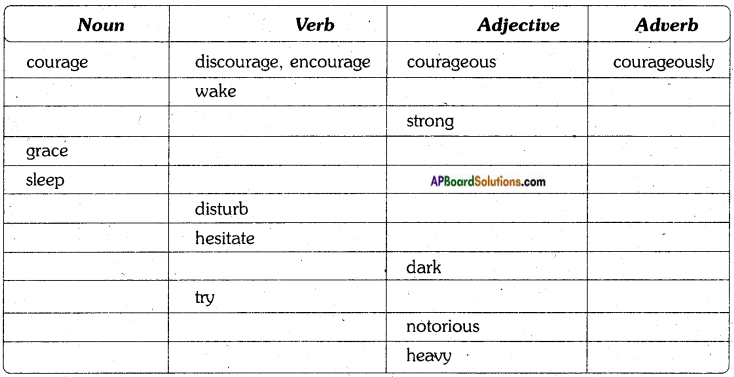
Answer:
| Noun |
Verb |
Adjective |
Adverb |
| courage |
discourage
encourage |
courageous |
courageously |
| wake |
wake |
wakeful |
wakefully |
| strength |
strengthen |
strong |
strongly |
| grace |
grace |
graceful |
gracefully |
| sleep |
sleep |
sleepless/sleepy |
sleepily |
| disturbance |
disturb |
disturbing |
disturbingly |
| hesitation |
hesitate |
hesitant |
hesitantly |
| dark/darkness |
darken |
dark |
darkly |
| trial |
try |
trying |
tryingly |
| notoriety |
– |
notorious |
notoriously |
| heavy/heaviness |
– |
heavy |
heavy/heavily |
B) Choose the right answer.
1) What a nice dress! ( )
a) congratulating
b) complaining
c) complimenting
Answer:
c) complimenting
2) I’m afraid it is not possible. ( )
a) expressing fear
b) giving an advice
c) refusing request
Note : ‘I’m afraid means ‘I’m sorry’.
Answer:
a) expressing fear
3) “Let’s go for a walk, shall we ?” ( )
a) seeking information
b) making suggestion
c) making a request
Answer:
b) making suggestion
4) I’m sorry, I thought it was my room. ( )
a) apologizing
b) making a statement
c) complaining
Answer:
a) apologizing
5) Shall I give you a cup of coffee? ( )
a) a request
b) offer
c) suggestion
Answer:
b) offer
6) Where can I get a car for hire? ( )
a) seeking information
b) making a request
c) making a suggestion
Answer:
a) seeking information
7) You had better do yoga every day. ( )
a) suggestion
b) request
c) order
Answer:
a) suggestion
8) It may rain in a few minutes. ( )
a) making a request
b) expressing purpose
c) expressing possibility
Answer:
c) expressing possibility
9) Would you mind closing the door? ( )
a) a request
b) an order
c) a suggestion
Answer:
a) a request
10) How careless of you to drop my pen! ( )
a) scolding
b) complaining
c) request
Answer:
a) scolding

C) Fill in the blanks with ‘a’, ‘an’ or ‘the’.
1. It is _______ _____ useful book.
2. _________ apple ________________ day keeps the doctor away.
3. He is _______________ M.L.A but his wife is ________________ M.P
4. He is ________________ B.A. but his wife is ________________ M.A.
5. He came from ________________ orthodox family.
6. There is ________________ eucalyptus tree in our garden.
7. ________________ girl, who has worn the blue frock, is my sister.
8. He is ________________ man of manners.
9. He is ________________ European but his wife is ________________ Indian.
10. I met ________________ one-eyed beggar in the street.
Answer:
1) a
2) An, a
3) an, an
4) a, an
5) an
6) a
7) The
9) a,an
10) a
D) Fill in the blanks with simple past tense or past continuous tense of verbs.
1. While he ______________ (cross) a road, he ___________ (meet) with an accident.
2. While she ______________ (sing) her sister ______________ (dance)
3. He ______________ (fall) asleep while he ______________ (watch) TV.
4. When I ______________ (enter) the room he (write) a letter.
5. When he _____________ (have) dinner someone _____________ (knock) on the door.
6. While Swami’s father ….(1)…. (read) the newspaper, Swami ….(2)…. (listen) to it. His father ….(3)…. (ask) him to sleep alone. But he ….(4)…. (be) afraid of ghosts. He ….(5)…. (want) to sleep in his grandmother’s room. While he ….(6)…. (sleep), he ….(7)…. (have) a terrible dream. A tiger ….(8)…. (chase) himand he ….(9)…. (try) to escape.
7. While Rani ______________ (sing) a song, Raghu ______________ (switch) off the fan.
Answer:
1) was crossing, met
2) was singing, was dancing
3) fell, was watching
4) entered, was writing
5) was having, knocked
6) 1. was reading
2. was listening
3. asked
4. was
5. wanted
6. was sleeping
7. had
8. was chasing
9. was trying
7) was singing, switched off .

E) Read the conversation given below and fill in the blanks with appropriate words from the box.
grateful, respect, certain , courage, sternly, afraid of, terrible, hesitated, disturb, disgraceful
Ruchira: I don’t know why the teacher ….(1)…. to give his mobile number?
Suhas: He might be worried that you would ….(2)…. him with your phone calls.
Ruchira: I have great ….(3)…. for him. I will never behave in a ….(4)…. manner.
Suhas: I am ….(5)…. that our teacher will not give his number. Anyhow, I like your ….(6)…. We are all ….(7)…. him.
Ruchira: I don’t think our teacher is ….(8)…. but he says everything ….(9)…. Once he gave me a wonderful gift so I am always ….(10)…. to him.
Answer:
1) hesitated
2) disturb
3) respect
4) disgraceful
5) certain
6) courage
7) afraid of
8) terrible
9) sternly
10) grateful
![]()
![]()
![]()


![]()
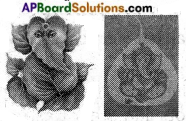

![]()
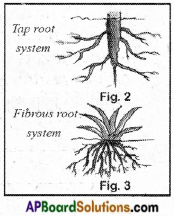
![]()
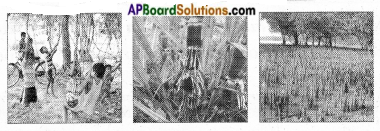
![]()

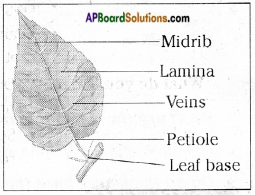
![]()
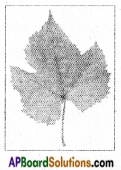
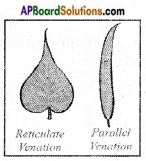
![]()
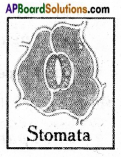

![]()


